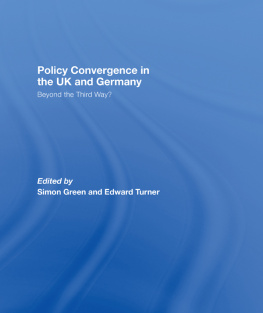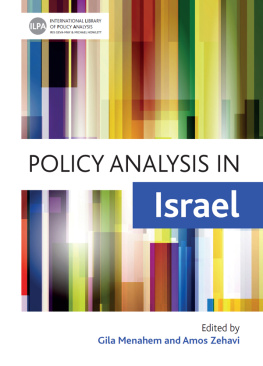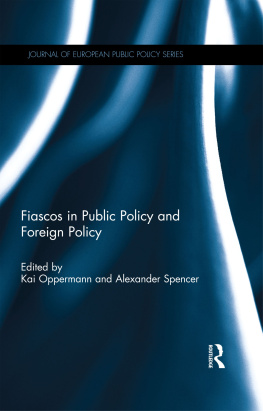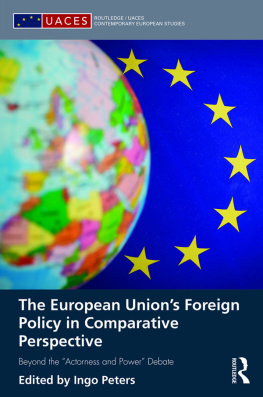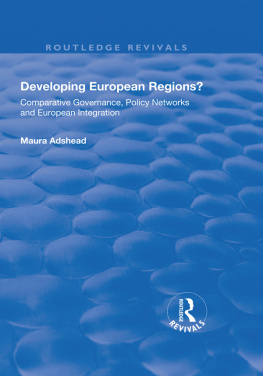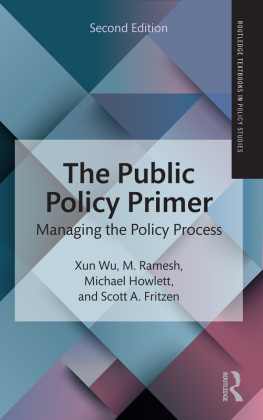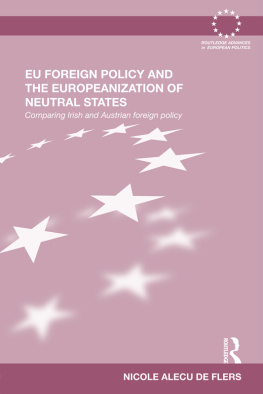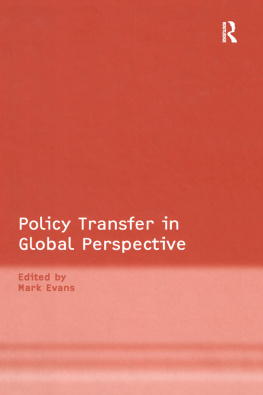Policy Convergence in the UK and Germany
Policy convergence and policy learning have emerged as central themes in the study of public policy in recent years.
This book complements the rich literature on theoretical aspects as well as individual case studies by undertaking a systematic comparison of policy convergence between two specific countries, the UK and Germany. Both are member-states of the EU and face similar policy challenges across a number of policy sectors; as such, both are ideally suited to such a comparison. In particular, in the late 1990s, the social-democratic governments of both countries explicitly sought to develop common solutions under the heading of the Third Way. By including analyses of not only of institutions but also of key areas of domestic and foreign policy, this volume makes a unique contribution to the study of public policy in two of the EUs key member-states.
This book was previously published as a special issue of German Politics
Simon Green is Senior Lecturer in German and European Politics at the European Research Institute and Deputy Director of the Institute for German Studies, University of Birmingham.
Edward Turner is a doctoral candidate at the Institute for German Studies, University of Birmingham.
First published 2008 by Routledge
2 Park Square, Milton Park, Abingdon, Oxon, OX14 4RN
Simultaneously published in the USA and Canada
by Routledge
270 Madison Avenue, New York, NY 10016
Routledge is an imprint of the Taylor & Francis Group, an informa business
2008 Edited by Simon Green and Edward Turner
All rights reserved. No part of this book may be reprinted or reproduced or utilised in any form or by any electronic, mechanical, or other means, now known or hereafter invented, including photocopying and recording, or in any information storage or retrieval system, without permission in writing from the publishers.
British Library Cataloguing in Publication Data
A catalogue record for this book is available from the British Library
ISBN 10: 0-415-44580-9 hbk
ISBN 13: 978-0-415-44580-1 hbk
Edward Turner and Simon Green
Introduction: The Notion of Policy Convergence in Britain and Germany
This collection of essays analyses the extent to which public policy has converged in the United Kingdom and Germany since the late 1990s. It examines the pressures for convergence, both endogenous and exogenous, and the outcomes over a range of different policy areas, discussing both the policy choices which have been made, and whether convergence can be seen, and also, as far as is possible, the pressures underlying those choices.
The two countries are ideally suited to such a comparison, constituting as they do important examples of modern industrial nations; what is more, both face parallel, if not necessarily equal, challenges on a range of issues. They are characterised by uneven geographic distribution of economic activity, with the eastern Lnder and areas such as the North-East of England similarly depressed. Both have grappled, albeit for very different reasons, with their public finances throughout most of the 1990s and beyond, which has periodically circumscribed the policies each government could actually implement. Internationally, both are trading nations, with corresponding exposure to international economic conditions and capital flows. Both are members of NATO and traditional Atlanticists in their definition of security policy. Structurally, both are facing adverse demographic developments, with ageing populations and reduced birth rates predicted to lead to a halving of support ratios by 2050, and corresponding impacts for welfare and pensions.1 Both are major destinations for migration and asylum seekers. Perhaps most importantly, both are member states of the EU, which ipso facto, through the adoption of common legislation in the form of EU Directives and Regulations, has led to at least some form of convergence; moreover, membership of the EU promotes negotiated and voluntary convergence, for instance via the open method of co-ordination. What is more, the culture of co-operation under the auspices of EU membership by definition makes cross-national policy learning and convergence in any case more likely.2
Certainly, the UK and Germany are by no means the only sources for cross-national policy learning. Indeed, both countries have frequently looked to solutions adopted elsewhere, for instance in the United States and the Netherlands. But what is perhaps most fascinating about looking at policy convergence in a UKGerman comparison is the political dimension. In the late 1990s, and after sometimes long periods in opposition, centre-left parties found themselves in government again across the developed world, including in the UK and Germany, where New Labour and the SPD won resounding victories in the 1997 and 1998 elections respectively. Seizing this moment, US President Bill Clinton and the new UK Prime Minister Tony Blair took the lead in attempting to give cross-national coherence to this development, by formulating what was heralded as a new kind of social-democratic political agenda. This agenda broadly fell under the label of the Third Way and was famously championed by the sociologist Anthony Giddens.3 Under this rubric, policy convergence and cross-national policy learning were integral elements of Third Way politics, as political parties looked to kindred spirits abroad for inspiration.
From the outset, the UK and Germany were seen as leaders in this process. Under Tony Blair, Labour in the UK had explicitly distanced itself from its traditional socialist roots, while the new German Chancellor Gerhard Schrder had successfully conjured up the image of a new centre ground in German politics (die neue Mitte) during the 1998 federal election campaign. And so it seemed only natural that, less than one year after the SPD swept to power in Germany, the two leaders should present their now infamous document on the Third Way in early 1999. In the context of this comparison, the paper itself in fact emphasised the need for a bilateral UKGerman approach to policy solution. As the two leaders argued:
We face the same challenges to promote employment and prosperity, to offer every individual the opportunity to fulfil their unique potential, to combat social exclusion and poverty, to reconcile material progress with environmental sustainability and our responsibility to future generations, to tackle common problems that threaten the cohesion of society such as crime and drugs, and to make Europe a more effective force for good in the world We need to strengthen our policies by benchmarking our experiences in Britain and Germany, but also with like-minded counterparts in Europe and the rest of the world. We must learn from each other and measure our own performance against best practice and experience in other countries.4

